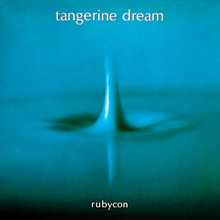Rubycon (album)
| Rubycon | ||||||||||
|---|---|---|---|---|---|---|---|---|---|---|
 | ||||||||||
| Studio album by Tangerine Dream | ||||||||||
| Released | 21 March 1975 | |||||||||
| Recorded | January 1975, The Manor, Shipton-on-Cherwell | |||||||||
| Genre | Electronic music, Ambient, Berlin School | |||||||||
| Length | 34:53 | |||||||||
| Label | Virgin Records | |||||||||
| Producer | Tangerine Dream | |||||||||
| Tangerine Dream chronology | ||||||||||
| ||||||||||
Rubycon is the sixth studio album released in 1975 by German electronic music group Tangerine Dream.[1] It is widely regarded as one of their best albums. Rubycon further develops the Berlin School sequencer-based sound they ushered in with the title track from Phaedra.
Although not quite matching the sales figures for Phaedra, Rubycon reached number 10 in a 14-week run, their highest-charting album in the UK.[2]
Music
The album consists of two long tracks, each just over 17 minutes long. “Rubycon, Part One,” the A side of the LP, “ebbs and flows through tense washes of echo and Mellotron choirs, as primitive sequencer lines bubble to the surface”.[3] The B side, “Rubycon, Part Two,” “opens in a wonderfully haunted way” before “the synthesizer arpeggios return to drive things along”.[3]
Critical reception
| Professional ratings | |
|---|---|
| Review scores | |
| Source | Rating |
| AllMusic | |
Tom Moon includes Rubycon in his 2008 book 1,000 Recordings to Hear Before You Die: "This voyaging vision of sound, ever-unfolding and not quite ever arriving, has been imitated endlessly since 1975. But somehow its admirers haven’t quite captured the openness and faraway grandeur of Tangerine Dream."[4]
In his book Digital Gothic: A Critical Discography of Tangerine Dream, music journalist Paul Stump praises the album, noting: “Rubycon is simply a refinement of its predecessor—but to an acme of excellence, and demonstrates a mastery of primitive technology breathtaking in its audacity, tenacity and sheer artistic vision. It is probably the best album the band have made…” [5]
Tour
Christopher Franke's Moog synthesizer was damaged in transit during a tour after the album was released, and Franke himself was nearly killed from an electrical shock.[6]
Track listing
| No. | Title | Length |
|---|---|---|
| 1. | "Rubycon, Part One" (Composed and played by: Edgar Froese: mellotron, guitar and VCS 3 synthesizer; Christopher Franke: double Moog synthesizer, Synthi A, organ, modified Elka organ and prepared piano; Peter Baumann: organ, EMS Synthi A, electric piano (Fender Rhodes) and prepared piano) | 17:18 |
| 2. | "Rubycon, Part Two" (Composed and played by: Christopher Franke: double Moog synthesizer, gong, Synthi A, and organ; Edgar Froese: organ, mellotron, guitar, gong and VCS 3 synththesizer; Peter Baumann: electric piano (Fender Rhodes), organ, EMS Synthi A, voice and ARP 2600) | 17:35 |
Personnel
Production credits
- Monique Froese – photography
- Mick Glossop – engineer
- Roland Paulick – technical assistance
Single
A single titled Extracts From "Rubycon" was released in March 1975.[7]
| No. | Title | Length |
|---|---|---|
| 1. | "Extracts From "Rubycon"" | 3:07 |
| 2. | "Extracts From "Rubycon"" | 3:09 |
Both tracks of this single were included as part of the compilation The Virgin Years 1974-1978 in 2011.
References
- ↑ Berling, Michael (29 September 2016). "Rubycon". Voices in the Net.
- ↑ "Tangerine Dream". Official Charts.
- 1 2 3 Swan, Glenn. Rubycon at AllMusic
- ↑ Moon, Tom (2008). 1,000 Recordings to Hear Before You Die: A Listener’s Life List. New York: Workman Publishing Company. p. 762. ISBN 076113963X.
- ↑ Stump, Paul (1997). Digital Gothic: A Critical Discography of Tangerine Dream. Trowbridge: SAF Publishing Ltd. p. 67. ISBN 0946719187.
- ↑ Prendergast, Mark (1994). "Tangerine Dream: Changing Use of Technology, Part 1: 1967-1977". Sound On Sound.
- ↑ Berling, Michael (29 September 2016). "Extracts From "Rubycon"". Voices in the Net.